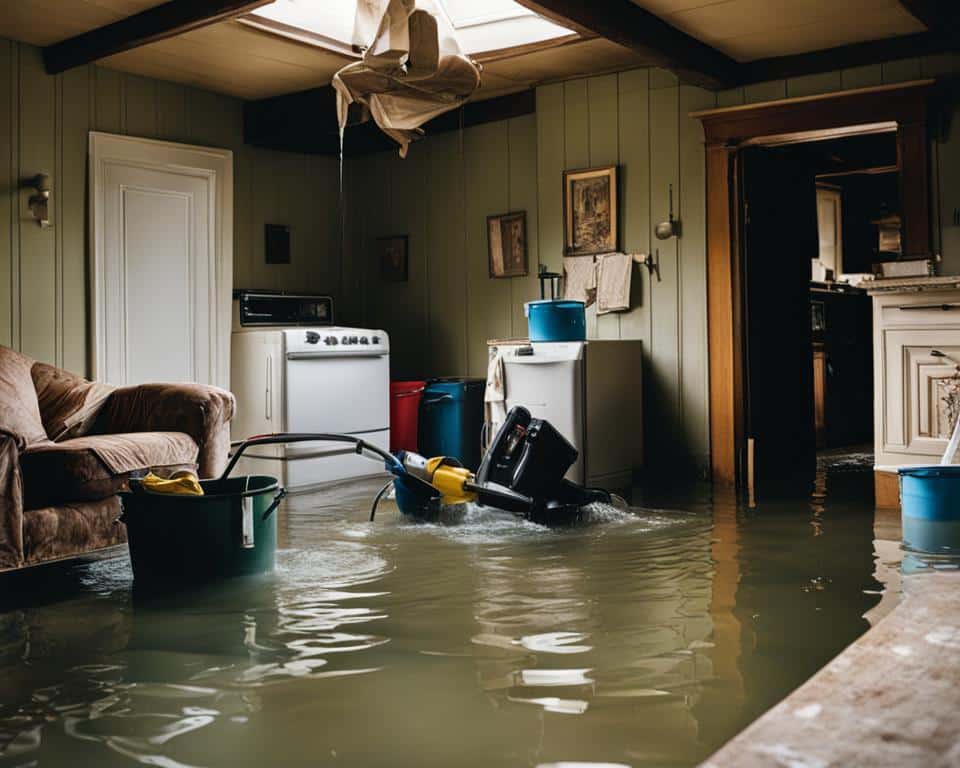Have you ever thought that quick reactions to water damage could actually worsen things? Many homeowners, in a rush, tend to make things worse without a proper game plan. Responding to water damage needs you to think and act carefully. What are the common mistakes to avoid? Let’s talk about the important steps you should skip right after facing water damage. Keep reading to learn how to manage water damage without causing more trouble.
Key Takeaways
- A comprehensive inspection of the property is essential.
- Identify and stop the source of water before taking further steps.
- Avoid rushing the drying process to ensure complete recovery.
- Develop a professional restoration plan before acting.
- Improper initial actions can compromise the safety and integrity of your home.
Understanding the Immediate Risks of Water Damage
When water leaks into a home, it brings immediate risks. The health dangers can be severe. The dampness in the air breeds harmful bacteria, viruses, and mold. These can cause breathing problems, skin issues, and more, especially for those already sick.
Acting fast to stop water damage is key. If left alone, it can damage floors, walls, and your belongings. This makes fixing things later much harder and costly. If sewage is involved, it’s even more urgent because of the health risks.
Checking the water damage thoroughly is very important. You need to see how bad it is and plan how to deal with it. Even old water damage can lead to big problems, like weakened structures. So, spotting water damage early, both new and old, is crucial for your property and health safety.
Avoiding Delay in Addressing Water Damage
Addressing water damage quickly is crucial. Water can spread swiftly, affecting various items. It can harden carpets and warp photos in minutes. Delays raise the risk of mold and structural harm, threatening both health and property.
From days 1 to 7, damage worsens, emphasizing the need for swift action. Immediate water mitigation lessens impact and prevents lasting effects.
Acting right away is key, and fast water damage repair is crucial. Services that act quickly can reduce damage significantly. They keep the building safe and its people healthy. Being aware of the emergency and responding promptly helps control the damage. It leads to a smoother and more successful restoration.
Importance of Turning Off the Power
When dealing with water damage, turning off the power quickly is key. This helps avoid dangers like electric shock and fires. If there is a lot of water, it might reach outlets or circuit panels, making things more risky.
Trying to get to a circuit panel in a flooded area is very risky and should be avoided. It’s best to get help from electricians. They know how to check things and make sure it’s safe before turning the power back on.
Getting help from a professional is important. They can stop dangers and check everything properly. This makes sure your place is safe before using power again.
- Immediately shut off power during water damage to prevent hazards.
- Avoid accessing circuit panels in flooded areas.
- Consult professional electricians for inspection and safe power restoration.
By following these steps, you can make sure you’re safe during floods. This reduces the risks from water damage a lot.
Why You Shouldn’t Ignore Visible Signs of Water Damage
When you see dark spots or peeling walls, it’s a big deal. These signs show there might be water damage. If you ignore it, the problem will get worse. Not only does it cost more to fix later, but it also poses a health risk. Mold loves to grow where there’s water damage.
It’s smart to check your home if you see these signs. Look for things like dark spots or bubbling paint. A musty smell, warped floors, or wet areas are also warning signs.
Mold grows fast in damp areas. It can be very bad for your health, especially if you have breathing problems. Areas that stay wet have a higher risk of mold. So, it’s very important to deal with water damage right away to keep your home safe.
Getting professional help is crucial. They can find hidden moisture and mold. Early action protects both your home’s structure and your family’s health.
What Not to Do After Water Damage?
When you face water damage, knowing what to do is key. However, knowing what not to do is also critical. Avoiding certain mistakes helps a lot in the water damage restoration process.
- Neglecting Professional Assessments: Skipping a check by experts can miss hidden damages. It’s important to let pros advise on fixing water damage. They make sure all problem spots get the right treatment.
- Delaying Mitigation: Act fast when water damage strikes. Waiting can cause mold and harm to your home’s structure. Quick water removal stops further issues and cuts down on repair costs.
- Attempting DIY Restoration: It might seem easy to clean up by yourself, but DIY often doesn’t work. Professionals have special tools and know-how to dry and fix your home completely.
- Using Hazardous Electrical Appliances: It is very risky to use electricals in wet areas. Leave water-damaged spots to the experts. They have the right gear to work safely in such places.
Avoiding these missteps makes the recovery process smoother. It helps protect your home and well-being better.
When to Call in Professionals
When you see water damage, deciding when to get expert help is key. Big floods, mold risks, or a lot of water damage mean you should reach out to pros right away. These experts are skilled in removing excess water, drying things up, and fixing damage. They also check for hidden moisture and assess any mold.
Professional services for water damage offer a complete solution. They handle thorough cleanup, quick structural drying, and the needed reconstruction. This not only brings safety back but also peace of mind. Their emergency skills are crucial during severe water damage cases.
Adding to this, hiring specialists can lessen water’s long-term effect on your property. They use fast methods and advanced techniques to manage the damage. This helps avoid mold and keeps your structure strong. Professional help here is very important.
Conclusion
Preventing water damage is as important as knowing what to do after it happens. It’s crucial to act fast to avoid further harm. Immediate dangers like electrical issues and collapsing structures need quick attention.
It’s key to turn off the power to stay safe. Don’t ignore damage that you can see. Know when to bring in the pros.
Experts can find and fix all the damage. They ensure unseen issues are also dealt with. This work is vital for the long life of your property.
To deal with water damage well, quick and smart moves are vital. You must act fast to control risks and restore the property. This advice shows how to be ready and aware. Following these steps helps keep your investment safe. It also saves you from big costs later on. Knowing these basics is critical for your property’s health.






